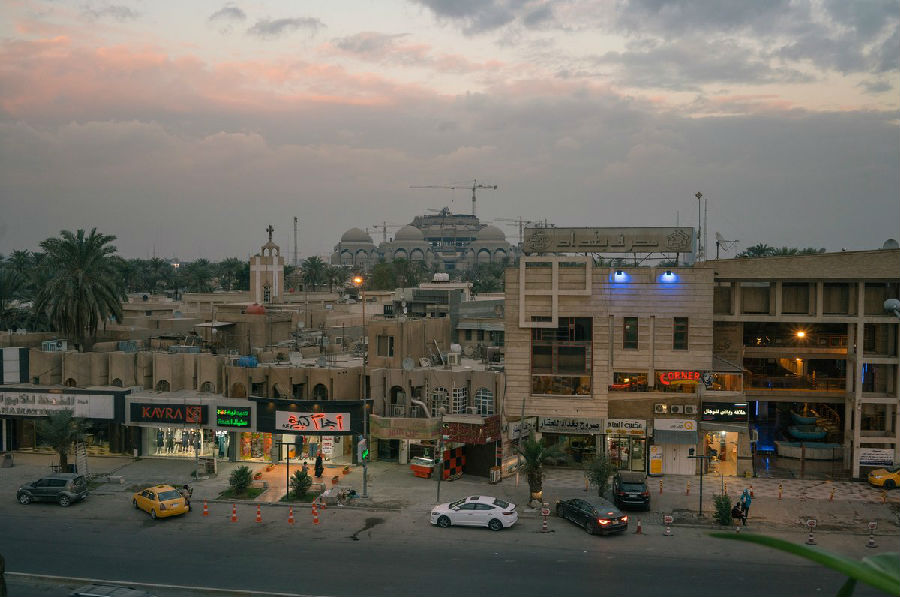Despite that, al-Abadi has managed to make only a tiny dent in the dizzying graft during his time in office.
盡管如此,阿巴迪仍設法在他任職期間在令人目不暇接的貪污案中取得了一點很小的進展。
He describes the anticorruption fight—his main election promise—as somewhat overwhelming.
他稱他的反腐敗斗爭 - 這也是他主要的選舉承諾 - 是具有壓倒性的氣勢的。
"People are calling on me to put corrupt people into prison,” he says. "Where do you start?”
“人們呼吁我把那些腐敗的人送進監獄,”他說。“問題是要從誰身上下手呢?”
Perhaps, some would reply, with the biggest culprits.
也許,有些人會說,從最大的罪魁禍首身上下手。”
Yet that could include powerful figures and leave al-Abadi himself politically vulnerable.
然而,這樣就會觸及到一些頗有權勢的人物,進而讓阿巴迪自己在政治上變得十分脆弱。
"No one really important ever goes to jail,” says Kirk Sowell, head of a Middle East– focused risk consultancy.
“真正重要的人從來不會進監獄,”某專注于中東的風險咨詢公司的負責人柯克·索厄爾說。
"If (Abadi) cracked down hard, there would be blood in the water."
“如果(阿巴迪)打擊腐敗的力度太大,就難免傷及國家的血肉。”
Yet on the streets of Baghdad, patience is wearing thin.
然而,在巴格達的街頭,人們的耐心已經消耗殆盡。
Many Iraqis are too young to remember life under the hated dictator Saddam—
許多伊拉克人都太年輕,不知道備受憎恨的獨裁者薩達姆統治下的生活是什么模樣 -
about 40% of Iraq’s 37 million people were not even born when the U.S. invaded in 2003, according to U.N. statistics.
聯合國統計數據顯示,2003年美國入侵時,伊拉克當前的3700萬人口中約有40%的人都還沒有出生。
Young Iraqis do not necessarily see themselves as having been liberated; they simply want a good government and decent prospects.
年輕的伊拉克人未必就認為自己是被解放了的;他們只想要一個好的政府和體面的未來。
"I want to get out of Iraq because I see no good future here,” says Mustafa Jassim, 25, a qualified fine-arts teacher working as a juicer in a downtown Baghdad market.
“我想離開伊拉克,因為我看不到這里有什么美好的未來,”25歲的穆斯塔法·賈西姆說,他是一名合格的美術老師,現在卻在巴格達市中心的一個市場當起了榨汁工。

Al-Abadi says he sees job creation as urgent.
阿巴迪說,他認為創造就業這一工作十分緊迫。
One obvious way to employ large numbers of Iraqis is to begin repairing the war damage.
一個顯而易見能夠給大量伊拉克人提供工作機會的舉措就是對伊拉克進行戰后修復。
In February, representatives from dozens of countries and hundreds of companies gathered in Kuwait for a conference on reconstructing Iraq after years of battle,
今年二月,數十個國家的代表和數百家公司齊聚科威特,商議如何重建經歷了多年戰爭的伊拉克,
which devastated large parts of Mosul and shattered infrastructure elsewhere.
因為那場戰爭摧毀了摩蘇爾的大部分地區,也破壞了其他地方的基礎設施。
Done successfully, it could be a "peace dividend,” says U.S. Ambassador Douglas A. Silliman, speaking from the Green Zone.
重建成功的話,人們便可分得“和平的紅利,”美國大使道格拉斯·西利曼在綠區發言時說道。
"Abadi is focusing not on rich donors but on reshaping the economy,” he says.
“阿巴迪注重的并非富裕的捐助者,而是重塑整個伊拉克經濟。” 他說。
"He is trying to give people hope that tomorrow will be better than yesterday was."
“他是想給大家希望,讓大家知道明天要比昨天更好。”
Two weeks earlier, al-Abadi had told me it would cost about $90 billion to rebuild the country—
兩周前,阿巴迪就告訴我,重建這個國家需要花費大約900億美元——
a job he believes is key to halting another onslaught.
而他認為,這項工作是阻止ISIS對伊拉克發起另一次猛攻的關鍵。
In late January, he invited TIME to sit in on a closed-door meeting in the old palace,
1月下旬,他邀請《時代周刊》參加在舊宮殿舉行的秘密會議,
with ambassadors from the U.S. , Britain, Japan, the U.N. and others, to discuss the upcoming Kuwait conference.
與來自美國,英國,日本,聯合國和其他地區的大使一起討論即將舉行的科威特會議。
He warned the diplomats that rebuilding Iraq quickly and effectively was crucial
他提醒外交官們,迅速有效地重建伊拉克,
not only for people’s daily lives, but also in order to stave off further terrorist threats.
不僅對人們的日常生活至關重要,也是為了避免進一步的恐怖威脅。
"It is a huge task,” he told them.
“這是一項艱巨的任務,”他告訴他們。
譯文由可可原創,僅供學習交流使用,未經許可請勿轉載。


